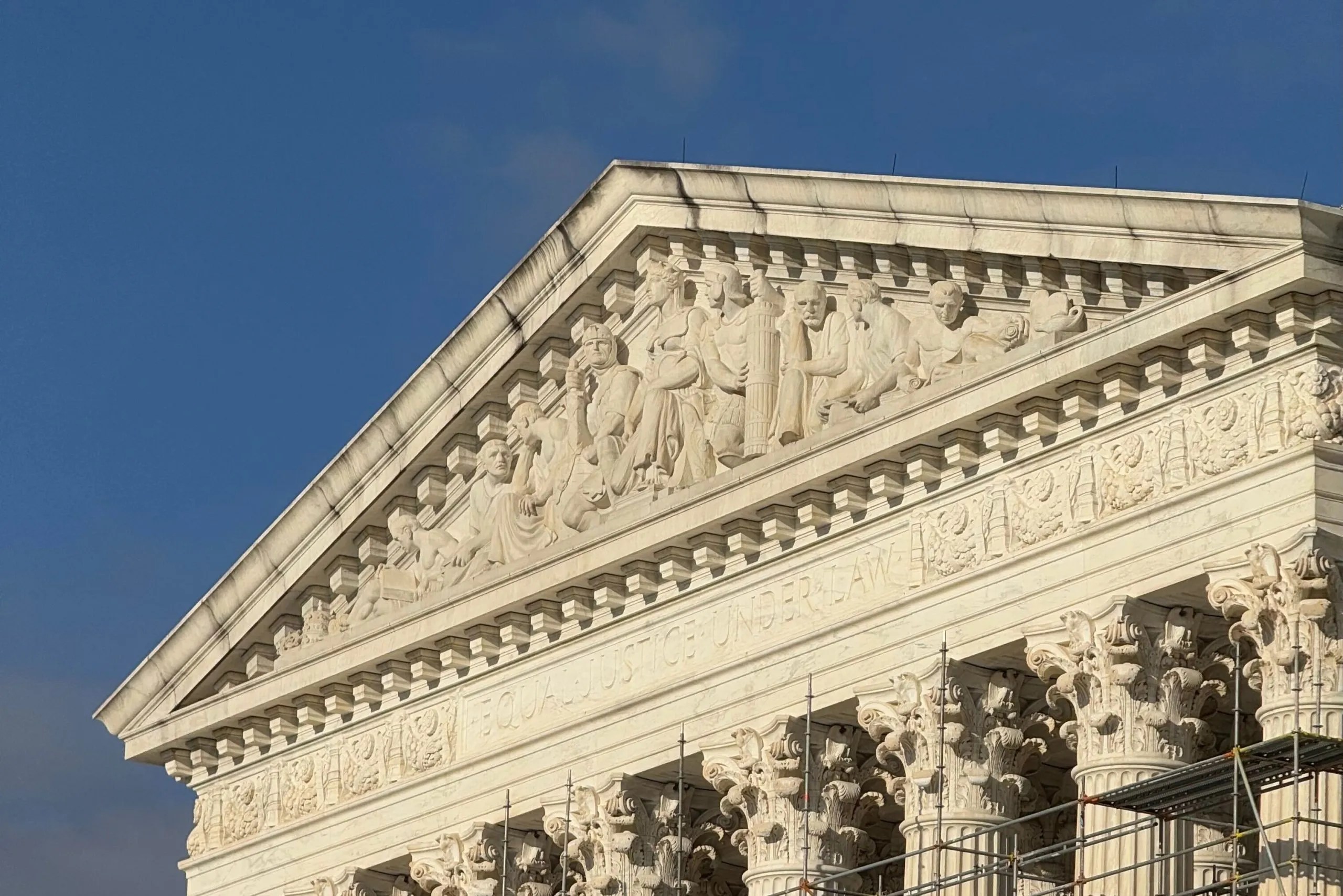SCOTUStoday for Monday, November 17


On this day in 1980, the Supreme Court issued its ruling in Stone v. Graham, which said that a Kentucky statute requiring a copy of the Ten Commandments to be posted in every public school classroom violated the First Amendment’s establishment clause. The decision is back in the spotlight as several states seek to implement similar policies on Ten Commandments displays, as SCOTUSblog reported this summer.
SCOTUS Quick Hits
- On Friday, the justices took part in a private conference and discussed cases and petitions for review.
- Today, the court is expected to release an order list at 9:30 a.m. EST, in which it will potentially announce additional cases that it has decided to hear this term.
- Later today, the Trump administration and lawyers for Illinois and Chicago will file what are expected to be their final briefs on President Donald Trump’s authority to deploy the National Guard to Illinois.
Morning Reads
- Supreme Court urged to block California laws requiring companies to disclose climate impacts (David G. Savage and Hayley Smith, Los Angeles Times) — The U.S. Chamber of Commerce and other business groups have filed an interim docket application asking the Supreme Court “to block new California laws that will require thousands of companies to disclose their emissions and their impacts on climate change,” according to the Los Angeles Times. “Their lawyers argue the measures violate the 1st Amendment because the state would be forcing companies to speak on its preferred topic.” The companies went to the Supreme Court after losing in front of a district court and while waiting for a response from the U.S. Court of Appeals for the 9th Circuit. “In August, U.S. District Judge Otis Wright II in Los Angeles refused to block the laws on the grounds they ‘regulate commercial speech,’ which gets less protection under the 1st Amendment.”
- Judge says he’ll approve opioid settlement with OxyContin maker Purdue and Sackler family (Geoff Mulvihill, Associated Press) — U.S. Bankruptcy Judge Sean Lane announced on Friday that he will approve “OxyContin-maker Purdue Pharma’s latest deal to settle thousands of lawsuits over the toll of opioids that includes some money for thousands of victims of the epidemic,” according to the Associated Press. “The deal … would require members of the Sackler family who own the company to contribute up to $7 billion over 15 years. The new agreement replaces one the U.S. Supreme Court rejected last year, finding it would have improperly protected members of the family against future lawsuits.” Under the new deal, “[m]ost of the money is to go to state and local governments to be used in their efforts to mitigate damage of the opioid epidemic.”
- Trump Implements Major Rollback of Food Tariffs (Gavin Bade, The Wall Street Journal)(Paywall) — President Donald Trump is adjusting his trade strategy as the Supreme Court prepares to rule on the legality of the tariffs he imposed using the International Emergency Economic Powers Act. On Friday, “Trump issued an executive order modifying the reciprocal tariffs he imposed on virtually every trading partner in August, exempting more than a hundred common food items including fruits, nuts and spices,” according to The Wall Street Journal. “The move is part of a shift from the administration to water down some of its so-called reciprocal tariffs in the face of both price increases for consumers and legal uncertainty following a high-stakes Supreme Court hearing this month. In their place, the administration has expanded other tariffs on individual industries like steel, aluminum and automobiles based on more established national security law—Section 232 of the Trade Expansion Act of 1962.”
- Catholic preschools appeal to Supreme Court in Colorado case over LGBTQ rights and religious liberty (Ann Schimke, Chalkbeat) — After a loss in front of the U.S. Court of Appeals for the 10th Circuit, two “Denver-area Catholic parishes asked the U.S. Supreme Court on Thursday to reconsider [the] lower court decision that said parish preschools participating in Colorado’s state-funded preschool program couldn’t deny admission to LGBTQ children or children from LGBTQ families,” according to Chalkbeat. The Catholic schools contend that Colorado is engaged in unlawful religious discrimination. “If the Supreme Court agrees to hear the case, the justices could answer a question at the heart of the case: Can private religious schools that accept public education dollars refuse to enroll certain kids based on religious principles? The state and two lower courts have said no.”
- The GOP May Not Need a New Law to Make Judges More Compliant (Michael Bobelian, Time) — In a post for Time’s Made by History series, Michael Bobelian drew comparisons between the pressure the Supreme Court faces today as it considers high-profile challenges to the Trump administration’s signature policies and the pressure it faced in the 1950s, as “congressional conservatives pushed to rein in the Warren Court for rulings that challenged and undercut the red-baiting that characterized the era of McCarthyism. Senate Majority Leader Lyndon Johnson thwarted their push, but it still helped to temper the Court’s activism for several years, until the arrival of new justices and a more favorable political climate produced another wave of landmark opinions,” Bobelian wrote.
A Closer Look: Duran v. United States
When it comes to the interim docket, those cases concerning the extent of President Donald Trump’s executive authority typically generate the most notice. The case of Duran v. United States, however, while having little to do with the president of the United States, is also of note. Duran is about competing claims to $40 million in a New York bank account. This money comes from the estate of Ferdinand Marcos, the former leader of the Philippines, who died in 1989, and, according to a ruling from the U.S. Court of Appeals for the 2nd Circuit, “stole billions of dollars from the Republic and its people and used networks of foreign financial accounts and shell corporations to hide [these] stolen funds.”
After years of litigating, multiple victims of Marcos’ schemes obtained judgments against his estate, including the Republic of the Philippines and a class of 9,539 individuals who suffered (or whose families suffered) at the hands of the Marcos regime. These creditors are fighting for control of the money in New York. A federal court in New York granted control to the republic after the United States commenced proceedings on its behalf, and the 2nd Circuit affirmed that judgment in August.
On Oct. 30, the class of individuals came to the Supreme Court and asked the justices to pause enforcement of the 2nd Circuit’s mandate as they prepare their appeal. A stay of the judgment is necessary to maintain the status quo, they contended, because without one, the republic will be free to transfer the money held in New York to the Philippines, which would likely moot (that is, no longer present a live controversy on) the U.S. dispute over the funds.
On Nov. 5, Justice Sonia Sotomayor, who is assigned to the 2nd Circuit, recalled and stayed the enforcement of the case pending further action from herself or the court. The United States filed its response brief on Nov. 12, contending that, even if it was allowed to begin working on “obtaining custody of the assets” and “then repatriating the assets” to the Philippines, it is likely to be “several months (or longer)” before the money leaves the U.S. For that reason and others, U.S. Solicitor General D. John Sauer wrote, the court should allow the 2nd Circuit’s decision to take effect.
Sotomayor cited Sauer’s brief in a Nov. 14 order vacating her stay and denying the request to put the 2nd Circuit’s judgment on hold. “Given the Government’s representation that it will not transfer the funds outside of the United States before the disposition of any petition for a writ of certiorari, the application for stay is denied,” she wrote. Although that order takes this case off the interim docket, the underlying legal battle is thus likely far from over.
SCOTUS Quote
“My view is, without deviation, without exception, without any ifs, buts, or whereases, that freedom of speech means that you shall not do something to people either for the views they have, or the views they express, or the words they speak or write.”
— Justice Hugo Black
On Site
From Nora Collins
Originalism and Judicial Oversight
Curious about what was discussed earlier this month at the Federalist Society’s National Lawyers Convention? Don’t miss Nora’s overview of discussions on the “golden age of originalism,” the first two decades of the Roberts court, and the court’s use of its interim docket. Nora also summarized remarks from Justices Brett Kavanaugh and Amy Coney Barrett on facing public scrutiny.
Contributor Corner
A Justice’s Most Lasting Legacy
In his latest Empirical SCOTUS column, Adam Feldman wrote about Supreme Court justices’ succession strategies and how their intentional cultivation of clerks and young judges is having “profound effects” on the federal judiciary. “The federal judiciary is … becoming, for better or worse, a self-perpetuating institution in which each generation of judges carefully selects and trains the next,” Feldman wrote.
Argument Analysis
Richard Cooke on Fernandez v. United States and Rutherford v. United States
On Wednesday, the justices heard two sets of arguments on what constitutes permissible grounds for a federal inmate to claim to have “extraordinary and compelling” reasons for compassionate release. Most of the justices appeared skeptical of the defendants’ claims, according to Richard Cooke’s argument analysis.
Posted in Featured, Newsletters